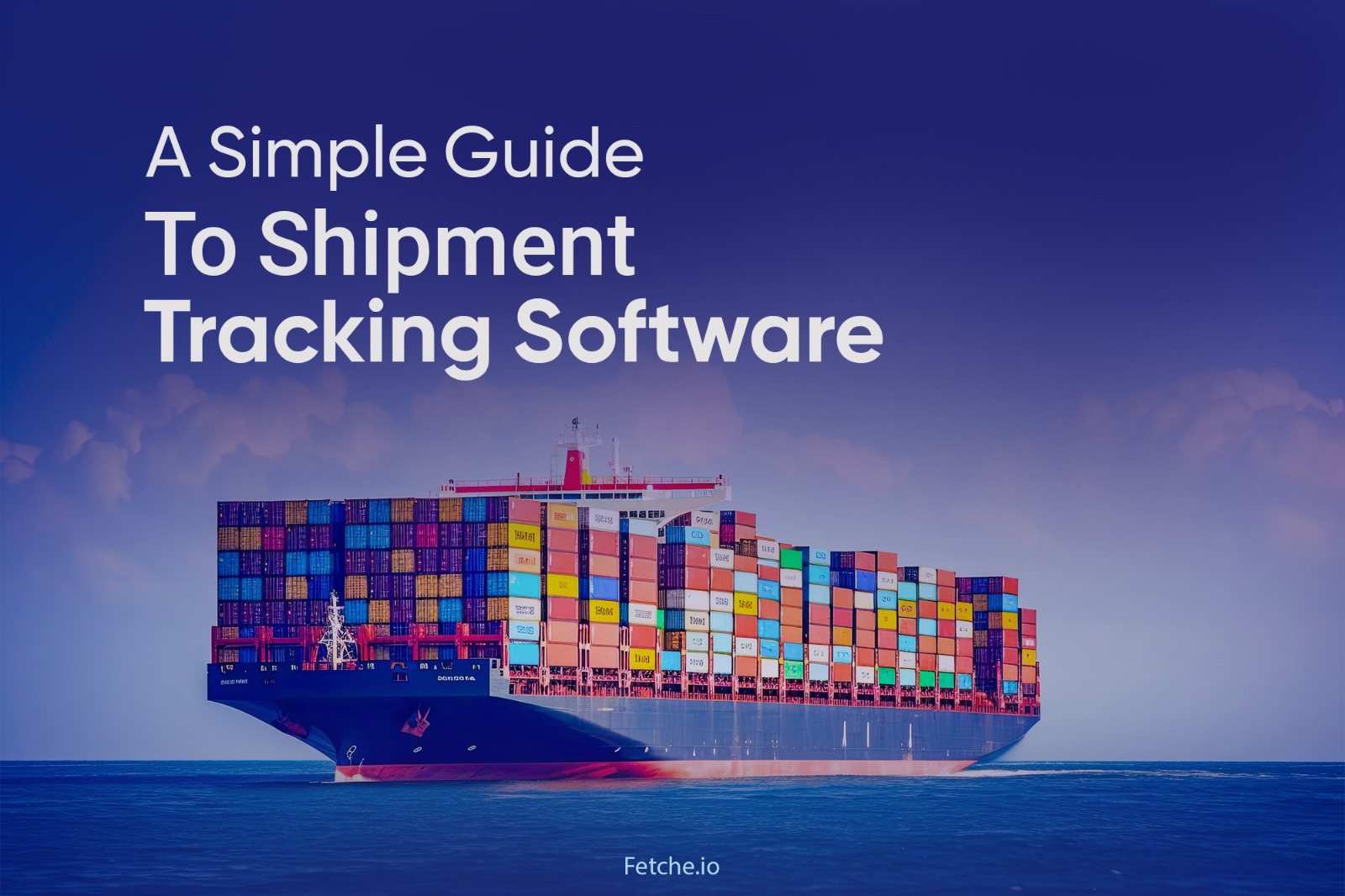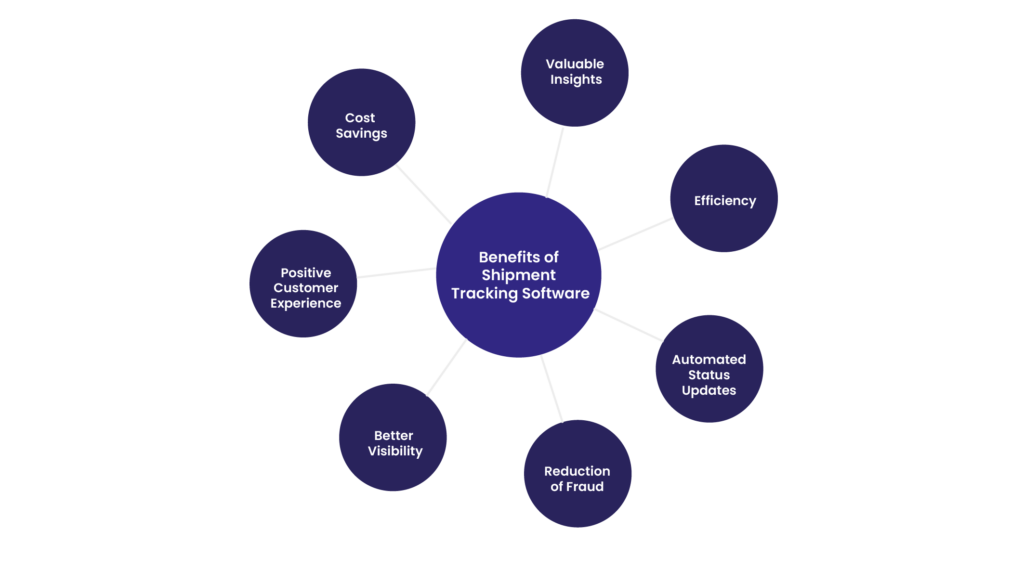
Timely and efficient delivery of goods is crucial for a business. Companies need to keep a close eye on their shipments to maintain customer satisfaction and streamline operations. This is where shipment tracking software becomes invaluable. It helps businesses manage their supply chains more effectively, reduce costs, and enhance the overall customer experience.
In this blog, we will explore what shipment tracking software is, its key benefits, and how it works.
What is a Shipment Tracking Software?
As the term suggests shipment tracking software is a tool used to track the movement of shipment. By using technologies like GPS, barcodes, and RFID tags, tracking software collects location data of shipments. This data is then displayed in a user-friendly format. Many businesses invest in freight forwarding software like this to know where their shipments are at any moment, to send automated updates to customers, and to keep a secure record of past shipments. Apart from these, shipment tracking software offers many other features.
Features of Shipment Tracking Software
- Real-time shipment tracking
- Automated alerts and notifications
- Integration with other logistics tracking tools
- Cloud-based shipment tracking
- Some of them can double up as route optimization software
Understanding How Shipment Tracking Software Works
As packages are shipped, each package receives a tracking ID. This ID or number will be used to track the shipment throughout its journey. So how does that work? Let’s try and understand. The tracking number we mentioned is linked to a barcode that is used to label the package. Now, as the package moves from one location to another, the barcode is scanned to update the tracking information of the package. Warehouses, shipping centers, and carrier trucks make up some of the points where the barcode is scanned. In some cases, GPS devices are used instead of barcodes to track shipments.
So what does the tracking software do with this location information? The software is responsible for collecting this large volume of data and then processing it. The data is thus displayed in a user-friendly interface and notifications might also be sent with each status update.
This is essentially how tracking works. However, according to the software you use you might notice differences in the working. Some tracking software can also send automated updates through email, SMS, or app notifications. For instance, customers might receive messages when the package is shipped or when it is out for delivery.
Why Use a Shipment Tracking Software

Shipment tracking software is a powerful tool that can help you monitor and manage all your shipments in real time. It can offer a freight management business a wide range of benefits. Let’s take a look at these benefits:
Cost Savings
A tracking software can identify delays beforehand. This will aid in preventing costly disruptions in the supply chain. The software will also help you reduce the risk of theft. Since the shipments are constantly tracked, goods are at minimal risk of getting lost or stolen. This software also optimizes routes, which leads to cost savings.
Positive Customer Experience
Your customers will be happy with the real-time tracking you offer. The tracking software can also give delivery estimates for the benefit of the customers. It can also provide automated notifications according to the status of the shipment. This will build trust and reinforce the transparency of your shipment process. All these will keep your customers happy and satisfied.
Better Visibility
You can see where your shipments are at all times. This will help you plan things accordingly. You can manage your inventory better and if there are any potential delays or issues you can inform customers or adjust delivery schedules.
Automated Status Updates
You can provide your customers with automated status updates as their package makes its journey to them. Your customers might receive messages when the package is shipped or when it is out for delivery. This will make them feel valued and they will appreciate the proactive communication.
Efficiency
Tracking software can reduce human errors and ensure that all shipments are sent to their correct destinations. It can also improve collaboration between different departments. This will mitigate any communication gaps as every department can access the same information.
Moreover, if you invest in freight tracking software with route optimization capabilities, you are sure to reap some long-term gains. Route optimization capabilities mean that your software compiles and analyzes vast amounts of data to identify efficient routes. The software will also use real-time traffic patterns to plan the delivery routes. This saves time and fuel.
Valuable Insights
A good shipment tracking software will have an in-built dashboard with valuable data. You can use this feature to sort through high volumes of data and analyze KPIs. You can identify areas where there is room for improvement and take steps to mitigate any issues. You can also generate comprehensive sales reports in a matter of minutes.
Reduction of Fraud
A freight tracking software can track the delivery of packages. Once the package is delivered you will have proof of delivery which will ensure that the package was delivered to the right recipient. You will also have the exact time of delivery. This will discourage fraud claims or false allegations against delivery staff.
As a Marketing Tool
This is one of the lesser known benefits of a shipment tracking software. By providing your customers with an easy way to track their orders, you are gaining trust. This will prompt them to recommend you to someone else. We call that word-of-mouth marketing.
Similarly, we have already mentioned that this software can provide you with valuable insights. Any marketer would tell you that marketing in rooted in data. Delivery times, customer locations, and shopping behavoiur can all be tracked through a shipment tracking software. Consequently, this data can be used for marketing purposes. Another underutilized form of marketing is personlalised promotions. On the tracking page of the software, you can show personlized offers, updates, and promotions. This will prompt your customers to become repeat customers.
Who Can Benefit From Shipment Tracking Software
The logistics industry might be the most obvious beneficiary here. But many other businesses can reap benefits from investing in this software. Let’s take a look at some of them:
E-Commerce Businesses
Timely deliveries are the cornerstone of any e-commerce business. No one would want to purchase from an e-com website that is notorious for late or lost deliveries. But with a shipment trackinng software, you can allleviate this issue. The software, as we already discussed provides real-time updates. This means that your customer would have a fair idea of when they can expect their package. They can see exactly where their package is at any given time, reducing their anxiety. This way chances of complaints are reduced. Customer experience would improve, positively affecting customer loyalty and brand advocacy.
Manufacturers
Most manufacturers do not realise this. But they could benefit from a shipment tracking software. Even small-sized manufacturers have multiple shipments to see to. There are raw materials coming in and there are finished products going out. A tracking software can offer visibility. And having such a supply chain visibility software can bode well for your business. After all it will help you reduce delays and identify bottlenecks in the supplychain.
Freight Forwarders
Freight forwarders handle multiple carriers and coordinate a bulk of shipments. There are so many things running in tandem to keep this system running. A good freight management software is a necessity in such a situation. We would recommend a shipment tracking software for your first investment. It can help you gain the following benefits:
- Real-time insights into cargo movement
- Coordinate different carriers and transportation modes
- Prevent delays
- Optimize all routes
- Notify clients about shipment status
Healthcare & Pharmaceuticals
Some industries are characterised by strict rules and regulations regarding shipping. The healthcare and pharmaceutical industry is one such example. Medications, sensitive medicine supplies, and vaccines are all highly regulated. Their transit has to be tracked strictly to ensure that they reach their destinations safely. Healthcare and pharmaceutical suppliers can thus benefit from shipment monitoring tools. This will help maintain compliance with regulations and ensure the security of the shipments.
Third-Party Logistics (3PL) Providers
3PL companies offer logistics solutions to their clients. Their operations are large-scale and delivery tracking solutions are a unavoidable part of it. After all, supply chain visibility would be next to impossible without a tracking system. A shipment tracking software would allow a 3PL provider to:
- Track the cargo of multiple clients
- Manage all shipments efficiently
- Optimize all delivery routes
- Reduce operational costs
- Enhance customer satisfaction
An Alternative: A More Comprehensive Solution
While shipment tracking software is very useful, using an ERP (Enterprise Resource Planning) system like Fetche can offer even more benefits. ERP software integrates all aspects of a business. This includes shipment tracking, inventory management, accounting, and customer service. By choosing an ERP you get more than just shipment tracking.
To put it in perspective, let’s look at some reasons why you should give preference to an ERP over a standalone tracking software:
- An ERP combines multiple functions into one platform.
- ERP provides better integration and reduces errors.
- Centralized data across various departments.
- It can grow with your organization.
- Provides better long-term value.
- Increases overall business efficiency by streamlining processes
- Advanced reporting and analytics.
- Automates cross-departmental workflows
Conclusion
Shipment tracking software is an essential logistics software for businesses to monitor and manage their shipments. It provides real-time updates, improves efficiency, and enhances customer satisfaction. However, for a more comprehensive solution, consider using an ERP system like Fetche. It integrates all aspects of your business, providing better data accuracy, improved reporting, and scalability. Take your business operations to the next level with Fetche.
